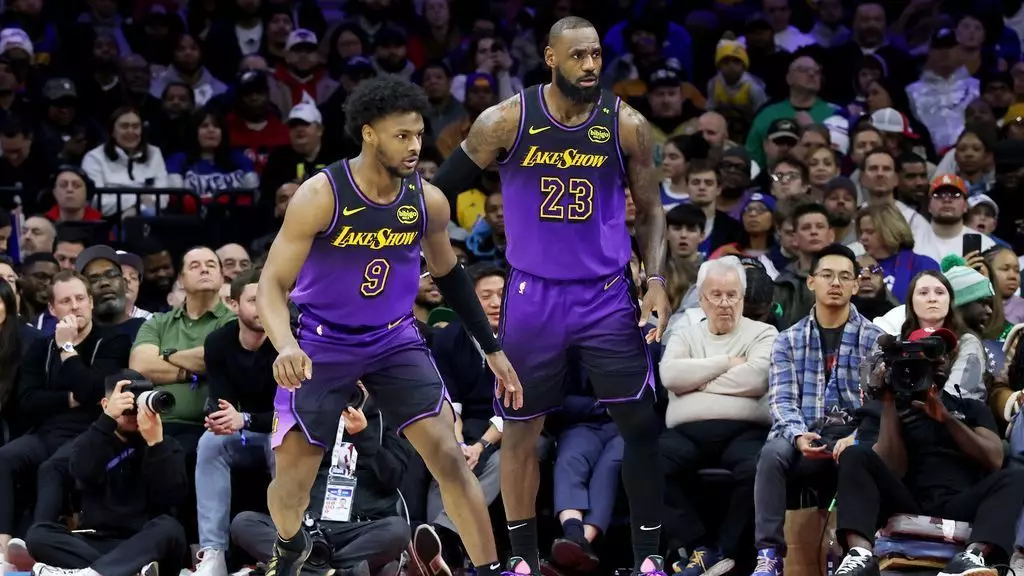The Los Angeles Lakers have always been a hub of basketball excellence, with a legacy overshadowed by the iconic presence of superstars like LeBron James. The recent decision by head coach JJ Redick to insert rookie Bronny James into the lineup during a nationally televised game against the Philadelphia 76ers sparked varied responses. While the potential of Bronny, the eldest son of LeBron James, is undeniable, his on-court performance raised eyebrows, leading to reflection on the challenges faced by young athletes stepping into the limelight.
Bronny James faced a steep uphill battle in his debut against the Sixers, managing a meager 15 minutes on the court without hitting a single shot—zero for five, along with three turnovers. Although statistical performance often dictates player evaluations, this game was not just about numbers; it mirrored the complexities of rookie life in the NBA. The pressure of performing in a high-stakes environment, especially with millions watching, can be overwhelming for any young athlete, particularly one carrying the weight of such a prominent surname.
Coach Redick later expressed doubt about his decision, suggesting that such a high-profile game was perhaps not the right stage for James’ first significant minutes. “Maybe put him in a tough spot,” noted Redick, highlighting a crucial consideration in player development. It underscores the question: when is it the right time to thrust a rookie into difficult situations, and how does that affect their growth?
In the realm of professional sports, the gap between practice and performance can be vast. Prior to this game, Bronny had impressed in the G League with the South Bay Lakers, rounding into form and exhibiting confidence with a notable 31-point performance. Yet, as his own words highlighted, the transition to the NBA isn’t solely about maintaining technical skills; it also demands mental fortitude and adaptability under pressure.
Faced with the harsh realities of an NBA game, Bronny found himself matched up defensively against Tyrese Maxey, a player possessing both speed and skill. The experience served as a valuable lesson, exposing him to the high level of competition that distinguishes the NBA from other leagues. “He’s a fast guard… Just trying to stand my ground,” Bronny reflected, indicating a recognition of the nuances required for defensive play at this level.
The narrative surrounding Bronny James needs to shift from immediate results to long-term potential. As LeBron noted, his son’s journey is just beginning, and setbacks are integral to any young athlete’s career. “Obviously, it’s his first extensive minutes with us,” LeBron pointed out, emphasizing that these growing pains are expected in a rookie’s career and indicative of the learning curve faced by many new players.
It’s vital for Bronny’s development to understand that each misstep on the court is a stepping stone toward improvement. The Lakers’ coaching staff has made a commitment to nurture his growth, granted that they remain conscious of when to place him in challenging scenarios.
As Bronny reflects on his latest experience, it’s essential for fans and analysts alike to retain a level of patience and understanding. In the NBA, talent is not just about immediate outputs; it’s honed over time, shaped by a combination of experience, coaching, and self-reflection. Each game presents an opportunity to learn, refine skills, and develop a deeper understanding of the sport—all essential elements in the journey toward becoming a proficient player.
Indeed, the future is bright for Bronny James, not solely because he has a legendary father but because he has the desire, talent, and determination to forge his own path. The NBA is notorious for its challenges, and how Bronny chooses to tackle them will ultimately define his career. As he continues to adapt and learn from experiences like Tuesday’s game, what unfolds next could be just the beginning of a promising career in basketball.


Leave a Reply